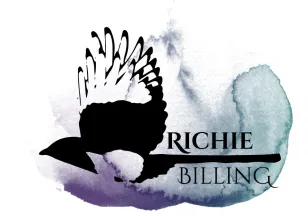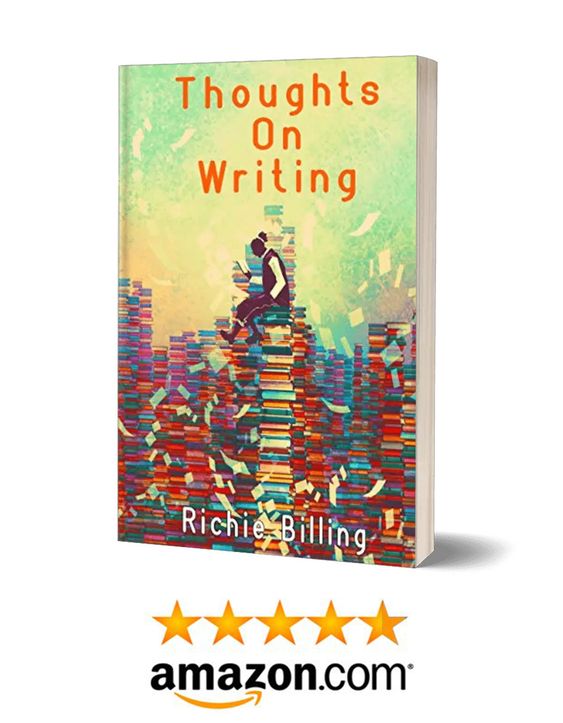American writer Jonathan Franzen attracted a lot of ire not long ago over a piece he penned for LitHub entitled ’10 Rules of Writing for Novelists.’
It’s his use of the word ‘rules’ that’s got everyone’s goat. If there’s one thing I’ve learned while studying the supposed rules of writing it’s that there aren’t any rules that can’t be broken.
Yes, there are basic laws of grammar, storytelling, dialogue, plot and the like, but beyond that, particularly when it comes to styles and approaches to writing prose, it’s all theory and preference.
Time and time again writers have broken established writing rules with brilliant effect. Franzen should have known better.
When somebody suggests a rule of writing, or a rule of writing a poem, for instance, I see it as their way of offering advice on the practices that have suited them best.
Is it arrogant to call them creative writing rules or writing rules for good writing? Probably.
If you’ve been in this game a while you’ve no doubt seen plenty of these lists. Elmore Leonard’s 10 rules of writing springs to mind. So too Strunk and White’s rules of writing. And, of course, George Orwell’s rules of writing.
The danger is for new writers, who in their sponge-like stage of absorption, can read misleading rules for writing a book, and then grow frustrated down the line when readers and editors tell them otherwise.
I suppose that’s a lesson in itself, one all writers have to learn—what may work for one writer may not work for another.
It was obvious that these so-called rules of writing espoused by Franzen had touched a nerve with many writers. I wanted to find out why exactly.
So I put the question to writers. I hosted polls over a couple of days in dozens of online writing groups on Facebook and received a total of 199 responses. Not a great sample size but there were lots of insightful comments too, so the exercise was a worthwhile one.
This is what I asked them:
What writing rules do you detest most?
What writing rules do you find yourself breaking often?
What writing rules do you not see the point of?
Which writing rules do you regard as outdated and no longer relevant?
The Results
| Answer | Number of votes |
| Use of passive voice | 37 |
| There’s rules? | 33 |
| Excessive use of adjectives | 25 |
| Adverbs | 18 |
| Never start a sentence with… | 17 |
| Show don’t tell | 13 |
| Write everyday | 12 |
| Follow these exact rules to the letter or you are a horrible writer and terrible person | 11 |
| Flashbacks are a no-no | 8 |
| Just let people write how they want | 7 |
| The rules are so that weak writers know how not to suck at writing | 5 |
| All nevers and alwayses | 4 |
| Don’t info dump | 3 |
| Jonathan Franzen is an entitled prick and can get bent 😉 | 2 |
| Not using ‘that’ so much | 2 |
| Real writers don’t follow any rules | 1 |
| Ending the sentence on a preposition | 1 |
| Total Votes | 199 |
Since tables aren’t much fun, I made a little infographic. Just click below to download.
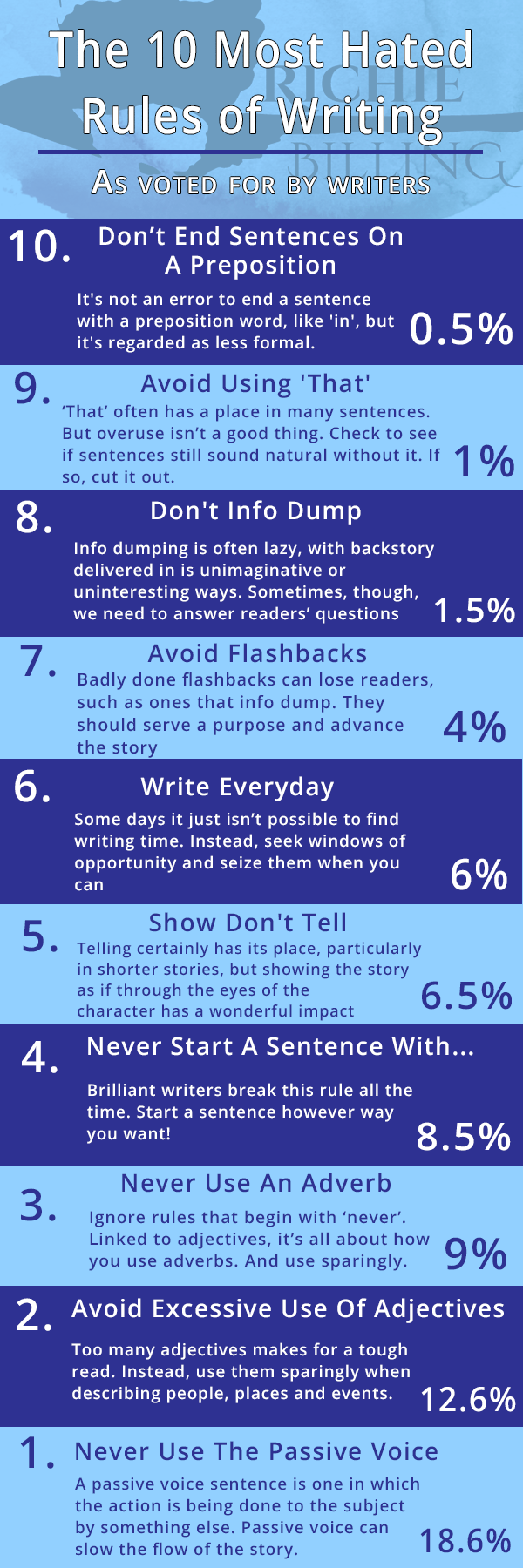
Click to Download the Writing Rules PDF
Select A Writing Rule
- Never use the passive voice
- Avoid excessive use of adjectives
- Never use an adverb
- Never start a sentence with…
- Show don’t tell
- Write everyday
- Avoid flashbacks
- Don’t info dump
- Avoid using ‘that’
- Don’t end sentences on a preposition
I’ve also recorded a podcast on this very subject for my fantasy writing podcast, The Fantasy Writers’ Toolshed. Listen on Spotify!
1. Never Use The Passive Voice
Sitting proudly at the peak is the rule against using the passive voice.
Going off my dealings with the passive voice, it can be a tricky area of grammar to fully understand, and that’s not the fault of writers.
Let’s see what writers had to say about it:
“Passive voice. I hate the generic “never use passive voice” advice, it’s such bull. Passive voice has a place, it’s just plain lazy to simply avoid it rather than learn it, it’s a tool like any other.” Anni Davison
“Passive voice is definitely the one I struggle with the most, I usually run my articles and books through Hemingway before submitting to try and cut some of it out. It just feels natural to write/talk that way.” Samantha Davis
“I argued with my teachers as a little kid over passive voice. I don’t subscribe to that “rule.” Never did. Who is anyone to tell a writer how to write and craft their own sentence? It’s insane and yes, sometimes it does sound better. Put down the red pen and just read and experience the story.” Laura Jones
“The one that is most troublesome for me is the “don’t ever use passive voice” rule, because it ultimately comes from a misunderstanding of what we use passive voice for in our language. The idea that “active voice” sentences are “active” and “passive voice” sentences are not is flawed. If I write “Jim threw the ball” or “the ball was thrown by Jim,” both sentences are equally active. Both show a ball being thrown. The main difference between the two sentences is the subject, and that is the critical point to consider. When an editor starts red-lining passive voice sentences in a paragraph, what they often end up doing is replacing a single subject for many, in turn making the passage more convoluted and harder to follow.” JM Williams
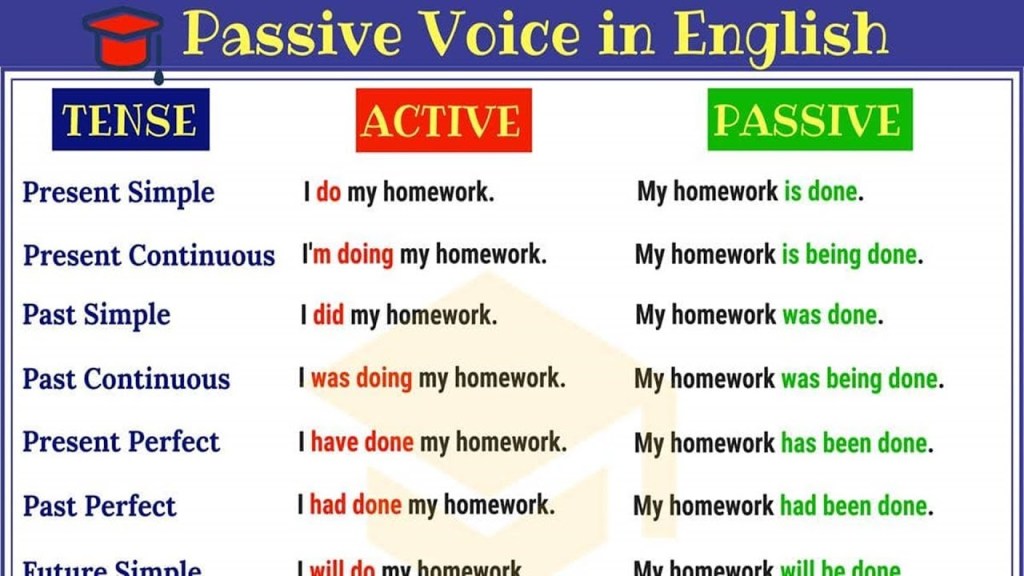
If you want even more help with this particular issue, check out my passive voice checker and converter here. It’s free to use and helps you identify passive sentences and then convert them into sentences that use the active voice.
2. Avoid Excessive Use of Adjectives
This is one that’s bandied about quite a lot—refrain from using adjectives. They do you no good. Supposedly.
I’ve looked into this rule quite a bit and what I’ve come to learn is that it refers more to how adjectives are used.
Click here to discover more approaches and details on how to use adjectives.
3. Never Use An Adverb
Adverbs have a similar reputation to that of their cousin, the adjective. I’ve heard many a writer exclaim their annoyance at reading the advice on adverbs in Stephen King’s On Writing only to then read one of his novels and find his story peppered with them.
The answer, I believe, is the same as with adjectives. It’s how you use the adverb.
4. Never Start A Sentence With…
I don’t see this writers rule thrown about too often, yet it’s scored pretty high on the list. The suggestion ‘begin sentences with conjunctions’ ties into this too.
It’s a ‘rule’ I’m aware of, but having read so many fantastic and award-winning writers who break it consistently I’ve come to see it as obsolete. Bollocks to it. Start a sentence any way you want.
5. Show Don’t Tell
I expected this creative writing rule to score a little higher on the list due to the number of complaints I see about it. Like some of the other rules of writing noted above, it seems to be how you use it.
“People parrot “show don’t tell” nowadays, not seeming to realize that there are parts that SHOULD be told. Otherwise, one’s protagonists just grimace, tremble, shudder, flush and twitch their way through the entire story (which gets tiring as well as ludicrous). And sometimes there IS a third alternative to either ‘telling’ or ‘showing’ — subtext!” Marya Miller
““Show, don’t tell!” (Yes, they do always seem to be shouting when they spout these so-called rules.) I’ve seen some rather extreme examples of this: “Don’t tell us that his car is red; show us.” *rolls eyes* How are we supposed to do that when all we have are the words?” Thomas Weaver
Click Here To See The Best Show Don’t Tell Examples For Writers
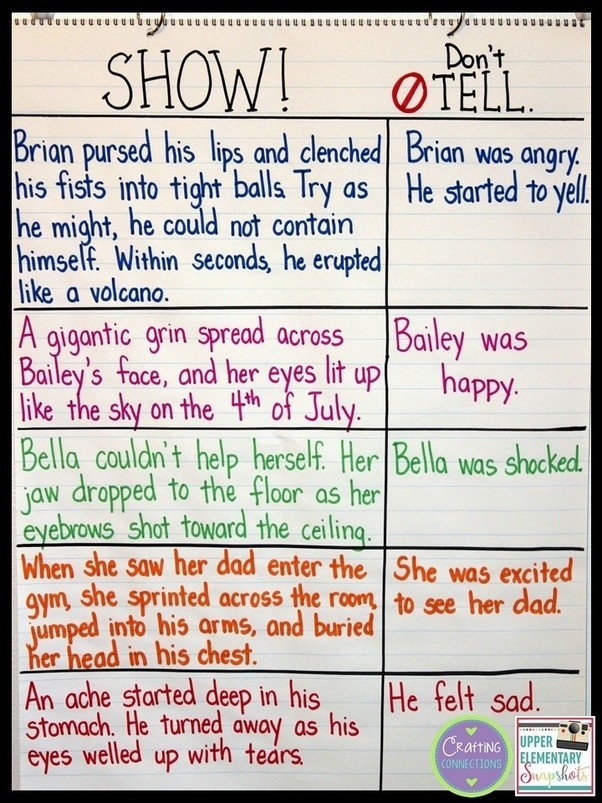
6. Write Everyday
This is one that often gets bandied about. Most of the time it comes from those fortunate enough not to have to work 40+ hours a week.
The reality for many people is that there isn’t enough hours in the day to work and write. Some days anyway. There are always windows of opportunity, and it’s up to us to seize them.
So when you come across somebody saying you’ll never be a writer if you don’t write everyday, or if they tell you it’s how you become a good writer, remember it’s quality not quantity.
It’s therefore unsurprising that this supposed writing rule scored so highly.

7. Avoid Flashbacks
This is an interesting one to crop up on this list of the most hated rules of writing. Flashbacks are a common feature in many books, bestselling and popular ones too. And they can take a variety of forms, from full chapters to snippets of memories.
I’m going to say outright that I like a flashback—if done well.
Herein lies the issue. Badly done flashbacks can lose readers. If the story is progressing well, tension is high and characters engaging, the last thing any reader wants is to pull away from the narrative to dip back in time.
Flashbacks that info dump—we’ll come to this next—are oft complained about. They serve little purpose other than to shovel backstory forcefully down our gullets.
Flashbacks need to serve a purpose. An exploration of a character’s past. The revealing of a significant detail. In short, it ought to develop the story in some way. In order to go forwards, we have to go back.
8. Don’t Info Dump
Info dumping is a common complaint amongst readers—myself included—so it’s nice to see only a smattering of my fellow writers voting for it.
As things go, this is one of the good rules of writing. Info dumping is often lazy, with backstory delivered in unimaginative or uninteresting ways.
The typical example is a lengthy prologue that tells you the history of the world—like the opening to Lord of the Rings where Cate Blanchett is yabbering on for ages, only ten times worse.
Or you get the overly descriptive character details. Every facet of this person’s life is explained before they even say a word. You end up hating the poor prick before he even does anything.
What can be said in favour of informational dumpage? It’s necessary in parts of our stories. There are times when lots has happened and unanswered questions have built up. At that point, it’s time for a good old spilling of the beans around the fire. But be sure not to give all of it away too soon. Readers may get bored.
9. Avoid Using ‘That’
Linked to some of the writing rules above, to avoid using the word ‘that’ is again related to one of overuse. It’s not to say that it can never be used. Just not as much as we often do. The reality is, ‘that’ often has a place in many sentences.
‘That’ is necessary in some sentences, such as when a clause begins with particular subordinating conjunctions, like before, in addition to, and while. An example:
- He gave up saying that he would take out the dog.
A good way to cut out ‘that’ is to check sentences that contain it and see how they read without the word. If they sound natural and intelligible, you can probably cut it. Crucially, the meaning of the sentence shouldn’t alter. An example:
- I wished she would come home.
You could add ‘that’ in there, but it’s also unnecessary.
10. Don’t End Sentences On A Preposition
What is a preposition you may ask? It’s a word that governs and usually precedes a noun or pronoun that expresses a relation to another word or part in the clause. That might sound like flux capacitors to you, so here’s an example:
- The man in the field.
- The conductor on the train.
It’s not an error to end a sentence with a preposition word, like ‘in’, but it’s regarded as less formal. Perhaps fitting better in the realms of emails and texts. It’s also fine to use when the preposition forms part of an informal phrase. An example:
- A solid piece of kit like this is hard to come by
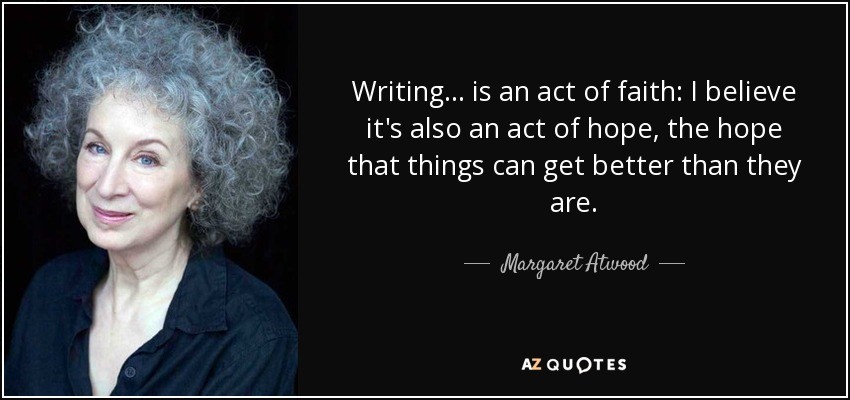
There’s rules?
Here’s an extra one for you. It scored quite highly and lots of people had something to say about it.
Yes, there are some rules, one of which is broken by this very suggestion. ‘There are rules?’
Let’s set the record straight, or as straight as it can be.
What do other writers think?
“I hate rules. Advice is cool. Learn tools and when, how, and why to use them. Strive to be a great writer and write with intention. But don’t let anybody tell you there is some set of rules that dictates good writing and separates it from that bad, ‘cos that’s just bullshit and it’s going to steer you wrong.” Kai Kiet Pieza
“I don’t think it was Franzen’s use of the word “rules” that annoyed people so much as the incredibly stupid advice he gave.” DL Mackenzie. In response, Janette Collins says:
“Honestly I do have a problem with the use of the word rules. Creativity should not be governed by rules.”
“[Franzen] penned this for The Guardian almost a decade ago. In that time he’s also published two novels, two collections of essays and a translation of Karl Kraus’ memoirs. So whether you choose to pour scorn on them or not, they certainly work for him.” Stevie Cherry.
“Know the rules so you know when and how to break them. Then break them with malice. That’s the best writing advice I’ve received.” Mary Caelsto-Lenker
“Thou MUST learn thy rules… that thou mayst know when they may be broken to the greatest effect.” Aaron Gallagher
“I before E except after C has been disproved by science. Outside of that, read Strunk and White’s The Elements of Style, Rules and guidelines are there to help us write. If they get in the way, let them slip. But if it feels or reads wrong, perhaps a look at the ‘rules’ will help.” Frank Booker
“I liked all 10 rules. If you can’t get over the word “rules” that’s your own problem (not you specifically OP). They’re obviously meant as guidelines, and they’re good and useful guidelines to follow unless you know how and why you’re breaking them.” Bobby Lee
“The 10 rules are exactly what I have learned over the years. None of them are always true, and bending them is a lot of fun. Part of the art of writing is knowing about them and understanding why these guidelines exist, working with them when it helps the prose, and knowing when you don’t have to listen.” Katharine Southworth
More Tools and Guides On The Rules of Writing
Thank you so much for checking out this research piece on the most hated rules of writing. I’ve found the process insightful and I hope you have too.
Below you can find links to some more writing tools and writing guides you may find useful.
- Orwellian Prose
- Showing Instead of Telling
- Writing tips
- How to write romance scenes
- How to format a manuscript
- Mental health in fantasy books
- 8 ways to kickstart your writing career
- What is characterization?
- How to write strong female characters
- How to edit
- What is StoryOrigin?
- How to plot a story
- What is passive voice?
- 4 ways to begin writing a novel
- How to plan a story
- How to plan a novel
- Tips on Grammar Punctuation and Style – a guide by Harvard University
- Tips On Improving Your Writing – a Guide by the Berkley Student Learning Centre
- Writing For The Web – Some useful tips on writing by the UK government
Writing Rules FAQ
This question often relates to George Orwell’s rules of writing, which are:
1. Never use a metaphor, simile or another figure of speech which you see often in print.
2. Avoid long words where short ones suffice.
3. If it’s possible to cut out a word, always do so.
4. Avoid using the passive voice where you can use the active.
5. Avoid complex and jargonistic words if you can think of an everyday equivalent.
These rules were first mentioned in Orwell’s essay, Politics and the English Language
Good writing is, above all, clear and widely understandable. If most people cannot make sense of the information you’re trying to convey, the writing becomes redundant. Short and concise sentences can help you achieve clarity, as well as avoiding jargonistic words.
The best way to start a piece of creative writing is to sit your arse in the chair and write. Remove distractions and allow yourself to focus. It may help to start with planning. Create your characters, determine what they want and the conflicting obstacles that stand in their path to getting it. The act of planning often sparks ideas and inspiration, and before you know it, you’ll be a few hundred words in.
Examples of creative writing include novels, novellas, novelettes, short stories, flash fiction, microfiction, poetry, plays, scriptwriting, screenplays, essays, journals, blogs, reviews, memoirs, speeches, lectures and songs.
Creative writing is the process of producing written content which displays invention, imagination and often originality. It is often distinguished from the likes of journalistic and academic writing, which focuses on objective facts and information.
Creative writing has many benefits for our mental health and wellbeing. It can give us purpose and focus, a means to channel our energies into. It also enables us to complete projects, the process of which can deliver great satisfaction and confidence. Creative writing can also be therapeutic. It allows us to tackle and explore problems in a reflective and deeper manner.
- 5 Tips to Help Your Child Learn and Succeed at Primary School - February 26, 2024
- The Advantages Of Using An AI Essay Typer Alternative - February 14, 2024
- Advice On Getting Help With Your Homework - January 26, 2024
